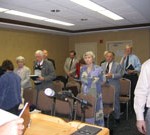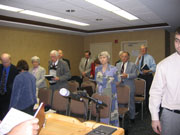This is third and final installment on things about church leaders and church planters can learn from Will Smith. Yesterday we looked at the first five principles of his success.

Here are the last five:
6. Understand ideas, and which ideas move people.
Smith says that when studying movies, and which ones are popular, he tries to back up and get the big picture. “I look at movies in their essence,” Smith says. “Will that idea sell?” If you look at the movies Smith does, he always does movies that focus on an idea or a story that resonate with the vast majority of people on the planet. He is not just trying to entertain, he is trying to connect.
This is key for church planters. Too often we get caught up in the entertainment mode. But entertainment is fleeting; personal connections are forever.
7. Understand universal patterns.
This is related to number 6. Smith calls himself a student of universal patterns. He watches for movements in worldwide society and culture, and then tries to focus on these patterns. He and his manager sit down every Monday morning any analyze the box office numbers for the past weekend, as well as the past 10, 20, and 30 weekends. He is looking for trends and patterns.
We too can look for universal trends, needs, and patterns. Study history, culture, and relationships. These are the areas in which God is at work.
8. Think globally.
Smith doesn’t just want people in the US to see his movies. He wants to be a worldwide movie star. So after a movie debuts in the US, he travels to England, Germany, Japan, Brazil, China, and promotes his movies. This, of course, makes him popular with the movie producers because it is more money for them.
So also with church planting. While our first focus is our neighborhood, we must also develop a global perspective. See the excellent book by Bob Roberts on this: Glocalization: How Followers of Jesus Engage a Flat World.
9. Go where the people are.
Since Smith didn’t initially have worldwide recognition, he knew it would be hard to get a worldwide platform unless he went where people were already gathering. So when he travels, he travels intentionally. He promotes his movies in South Korea at the World Cup, in Brazil during Carnival, and is headed to Beijing for the 2008 Olympics. Why try to gather a crowd on your own when you can just use a ready-made crowd?
Churches often try to gather their own crowds, and they spend huge sums of money and large amounts of time to do it. Why not just go to wherever the crowds are already gathering in town?
10. Never neglect what is important: family.
This I though was the most amazing thing of all. Hollywood actors are not known for stable marriages, mostly because they are trying to follow their dreams and make it big. Smith has been married for 10 years and says, “Our first official date was with a relationship counselor. The math is simple. Start while it’s good. Do it three times a week while you’re laughing and still having fun. You get so much more work done. You head off problems. Do it during the ether time, and do it aggressively.” Smith knows that all of his fame and glory is nothing if he doesn’t have a his wife and kids to share it with.
Church planters and church leaders take heed! What good does it do to have a huge church if you lose your wife and kids in the process?
Conclusion
Most of these ten principles are driven by secular goals. But if you go back through them, and substitute in spiritual, biblically-based goals, you have a surprisingly good list of what it takes to hear God say “Well done, good and faithful servant.”





 (Note: This post on church planting principles from Will Smith is from 2007… back when I thought I was going into church planting.
(Note: This post on church planting principles from Will Smith is from 2007… back when I thought I was going into church planting. 



